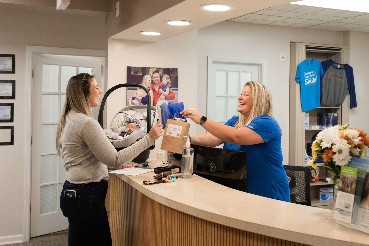Tethered Oral Tissues
Tethered Oral Tissues (TOTs) are restricted soft tissue (frenula) in the mouth, also known as tongue-tie, lip-tie and cheek-tie. TOTs impact function, growth and development of the jaws, mouth, teeth and airway. TOTs related issues include:
- Infants: painful breastfeeding, difficulty breast or bottle feeding, reflux or colic symptoms, and/or failure to thrive.
- Toddlers, Children & Adolescents: difficulty swallowing solid foods, speech/articulation disorders, orthodontic issues, as well as possible sleep and breathing problems.
- Adults: snoring, obstructive sleep apnea, neck tension, TMJ pain and dysfunction, orofacial myofunctional disorders, and headaches.
Tongue Tie
A tongue-tie, also known as ankyloglossia, is a condition in which the frenulum or attachment of the undersurface of the tongue to the floor of the mouth is tight and restricts function. It is a very common cause of painful or difficult breastfeeding in infants. Many infants have disorganized swallowing and do more ‘gulping’, have higher rates of reflux and colic symptoms, fatigue quickly, and may be constantly hungry from the poor transfer of milk. Difficulties may be present with bottle feeding as well. Untreated tongue-tie can often lead to many problems as children grow and develop. It may also lead to speech and articulation issues where tongue mobility is impaired, such as difficulty with letters “t,” “d,” “z,” “s,” “th,” “r” and “l.”

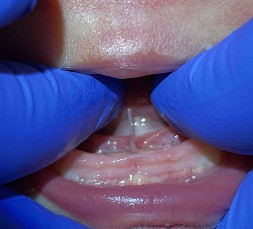
Lip Tie
A lip tie is when the maxillary (upper) or mandibular (lower) labial frenulum tissue that connects the lip to the gums is tight and restrictive to both function and form. In infants, it may prevent flanging of the lips to ensure an adequate seal around the nipple, in many instances, this can break the latch or allow babies to suck and swallow air and develop symptoms of reflux or colic. As teeth erupt it may cause excessive gaps or diastema and lead to orthodontic issues and dental decay. They also may lead to speech and articulation issues where lip mobility is impaired, such as difficulties with letters ‘b, f, m, p, v’ amongst others.
* Not all lip, tongue, or buccal ties will look the same. Functional assessments are essential in determining a need for a release.
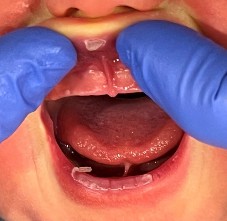
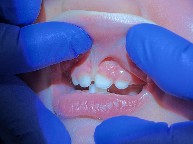
Buccal Tie
A buccal or cheek-tie is a restricted frenulum that connects the cheek to the gums. These can restrict the function of the cheeks and lips that are needed for feeding and/or speech. They have also been shown to cause issues with gum recession and orthodontic problems.
Why CO2 Laser?
Dr. Clayton provides her TOTs releases with a carbon dioxide (CO2) laser. In comparison to surgical scissors or other styles of lasers, there is an ability to accurately and delicately cut and coagulate soft tissue simultaneously. Benefits include minimal bleeding, less trauma to the tissue, reduced postoperative pain, and increased visibility of the surgical field. This helps reduce the amount- if any- of anesthesia needed, as well as not needing sutures in infants and toddlers. A secondary benefit is that the laser also sterilizes the wound leading to decreased infection rates.
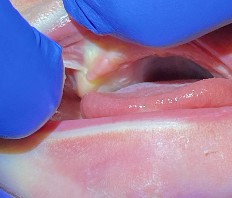
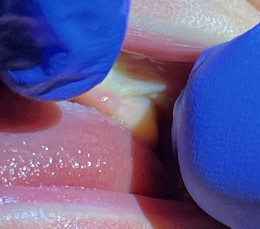
What is a frenectomy?
A frenectomy is a procedure that repairs the frenum through the elimination of restriction. The aim of this procedure is to remove excess tissue from the frenum which enables a greater range of motion in the tongue or lip. Dr. Clayton’s approach is targeted at addressing the restriction and to alleviate symptoms. These restrictions can sometimes be difficult to spot, but Dr. Clayton’s functional assessment at your consultation will help you understand whether your infant is a candidate for a frenectomy. Frenectomy procedures alone are not always the answer. Dr. Clayton may make recommendations to ensure we treat the root cause of dysfunction for you and your infant. We have many preferred providers such as IBCLCs (lactation consultants), body work (chiropractor, pediatric physical therapists), occupational therapist, etc. to ensure an overall successful outcome. Dr. Clayton will also demonstrate and discuss recovery protocols with parents, to maximize outcomes.
OUR TEAM APPROACH
Dr. Clayton feels that post-op care is important to the success of the release. Frenectomy procedures alone are not always the answer. Dr. Clayton may make recommendations to ensure we treat the root cause of dysfunction for you and your infant. Essentially, the baby must learn how to use his or her tongue in a new way. Some babies need no help at all and immediately breastfeed post-procedure, while other babies may need help from additional professionals. We have many preferred providers such as IBCLCs (lactation consultants), body work (chiropractor, pediatric physical therapists), occupational therapist, etc. to ensure an overall successful outcome.
Tips for a successful Infant Frenectomy Consultation
Tip #1: Filling out paperwork prior to your appointment ensures for the quickest appointment. It is important that we assess not just the restriction of the possible tie but we want to know what other symptoms the tie could be causing. We realize this may take some time to review. All of our forms are located here on our website! If you cannot do the paperwork prior to the appointment, ensure you allow plenty of time to do the paperwork prior to your appointment time. We have digital paperwork you can fill out at the office.

Tip #2: Know that we are here for you and your family! We want to ensure your questions or concerns are met and you are heard. Our team members are here to listen. If you think of any questions prior to your consultation place write them down so we can discuss them at your consultation! Dr. Clayton and her dedicated surgical assistant Kriston are happy to answer any questions!

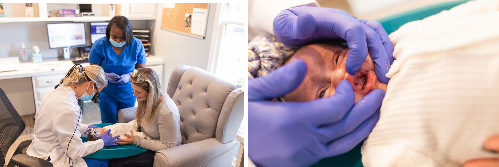
Tip #3: Stretches and follow ups are one of the most important parts of our process. If Dr. Clayton determines your child needs a release or frenectomy, we will review any aftercare at this appointment. It may be helpful to have a support person available if you have other children present to allow for us to review post-operative instructions and to schedule follow up appointments.
